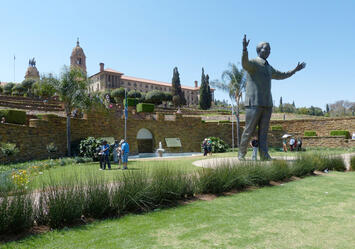
Dr Pali Lehohla is the director of the Economic Modelling Academy, a Professor of Practice at the University of Johannesburg, a Research Associate at Oxford University, a board member of Institute for Economic Justice at Wits and a distinguished Alumni of the University of Ghana. He is the former Statistician-General of South Africa.
Dr. Lehohla and I sat down on Sunday 25th of June and talked about the History of South Africa. We talked about why the ANC in 1994 took a wrong developmental path, that was informed by foreign dogmas, inspired by the Chicago School of Economics. There is now an acknowledgement within the higher ranks of the ANC that SA has to move towards an Asian Tiger Model. That a mixed economy between state spending, on heavy industry, and a free market that diffuses the technology is the way forward.
Highly targeted technological growth is how China uplifted millions of its citizens out of poverty, it’s how Japan became the first non western country to industrialize, it’s how Iran is surviving under sanctions, it’s also how all EU social democracies work. In fact it’s also how America works, if one takes into account that most of the Silicon Valley innovation initially started within the US Military.
My personal view is that white South Africans should reflect on their fear about government spending on critical infrastructure, because even during Apartheid, Transnet, Eskom and Spoornet were all nationalized utilities. Even pension fund money was directed at them. I am not suggesting that we gamble with the future of our children, but that we stop being scared of investing the money of our children, wisely, in the future of South Africa.
It’s a completely legitimate demand of the black South Africans, who are living in far more dire conditions and poverty than us, to suggest that all they want is what the whites had under Apartheid. By asking for an Asian Tiger model, they are basically asking for the same developmental path that was first envisioned by Field Marshall Jan Smuts and Hendrik van der Bijl (the founder of Eskom, who worked for General Electric and was inspired by America’s New Deal).
It’s the way to find employment for the two third of all young South Africans that are currently unemployed and have resorted to a life of crime.
-
It requires state spending
-
it requires the dynamism of the free market
-
it’s not a threat to state utilities and it’s not a threat to business interests
-
it is the sensible political compromise that would guarantee that the future of our country belongs to all who live in it.
-
It’s a much better proposal than the current “just” energy transition that is set to reprovoke historical conflicts, if it’s done under the dogma that “markets will solve everything'“.
The model is in line with our historical traditions, it’s in line with our Grand Strategy (i.e. that the survival of the state depends on cooperation), and it’s in line with what macroeconomists like Dr. Lehola is saying.
I would like to thank Dr. Lehola for this frank conversation, it is time that we break the dogmatic narratives open and legitimately demand that our government policy, as it relates to critical matters of energy, to be written by nobody else than South Africans.
This piece first appeared at: Hügo's Substack.
Hügo Krüger is a South African born Structural/Nuclear Engineer, writer and YouTube podcaster, commentating on topics relating to Energy and Geopolitical Matters, Hügo is married to an Iranian born Mathematician and Artist; the couple resides in Paris.
Photo: Nelson Mandela statue in front of the Union Buildings, Pretoria South Africa, in Public Domain.












